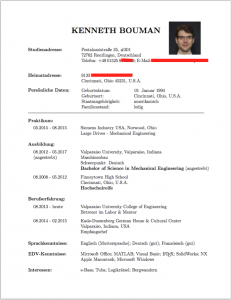Exciting stuff, I know.
How do you find a co-op placement for your spring semester?
First, you need a résumé (der Lebenslauf), formatted according to German sensibilities. Mine looks like this:
Write your own before you even head to Germany. Fill in any of the blanks (telephone number, address) once you arrive. Also, be sure to get a few sets of professional German eyes to proof it for mistakes or unnecessary bits. One such professional German told me to throw a scan of my high school diploma on the second page.
The cover letter (das Anschreiben) is the other part of the application materials (Bewerbungsunterlagen, plural) that you’ll need to prepare. Since this is a more complicated piece of literature (e.g. an actual piece of literature, as opposed to a list of facts and achievements), you’ll want to be getting some professional German help with this, regardless of how good you think your German is (or how good you Dunning-Kruger know it is).
Herr Veit in the Reutlingen International Office can be of assistance. In my case, I had help from a German colleague at Siemens last summer with the first draft, and further revision help from friends Isa and Jojo.
Herr Veit can also be useful in getting the Bewerbungsunterlagen sent out to various firms. In my case, my placement came through a family friend of family friends Isa and Jojo.
What are some of the details of my co-op?
Glad you asked. Bosch is probably more common in Baden-Württemberg than Wal-Mart is in the states. There are at least 2 plants in Reutlingen, and I wouldn’t be surprised to learn of additional facilities in town.
While Reutlingen is certainly conveniently located for people living in Reutlingen, my placement ended up being in Leonberg, a town (imagine a nearby suburb by US standards) west of Stuttgart. This means a decent commute each day, which would be inconvenient if I had to personally control any of the vehicles that get me there (somebody doesn’t particularly enjoy driving). If everything is on time (a bold request of Deutsche Bahn – German trains aren’t nearly as punctual as they’re rumored to be), I can be there 64 minutes after I leave Reutlingen, but it usually takes a little longer to get back. Commuting is super cheap with the Anschluss Studi-Ticket, and the travel time provides ample opportunity to fully wake up, eat breakfast, read, stare out the window at the subtle beauty of the Swabian Jura, and be fully ready to work by the time I arrive.
The facility in Leonberg is for development (no production), and much of the activity there centers around automobile proximity sensors and associated software. Think cruise control where your car will go as fast as you tell it to on the interstate, but will automatically slow down if traffic slows down. These sensors may also beep at you when you get close to scratching your paint as you back up, and will eventually be the eyes of self-driving vehicles. Anyway, at the facility, there’s a garage with several test vehicles, and modest capability for small-scale prototyping, but most of the work seems to be carried out on computers.
My tasks are varied, since they’re used to accommodating 6-month interns, while I’m only there for 4.5 months. So far, I’ve helped with error analyses, proofread translations, mounted test samples of different materials for easy comparison, and examined the feasibility of using different materials in place of currently-used ones for production models. It’s a ton of fun, and really fulfilling – just what a co-op should be.
How does payment work?
Pretty mundanely, in fact. Set up a bank account, fill out the correct numbers on the form, get paid.
The trickiest part of this was setting up the bank account. I talked my way in without an appointment, and they were willing to accommodate me, but it’s probably best to just set up an appointment at a bank sufficiently in advance that you’ll have an account before your placement begins.
Don’t worry about not knowing the right German to open the account. You’ll be able to talk your away around what you want to know. And in the event that you completely miss something, every piece of information is also presented in the traditional German manor – printed out on many many pieces of paper.
I did have to do a perspective switch regarding currency. From August to February, I was happy to see the exchange rate decrease from €1=$1.15 all the way down to 1:1.05, eventually settling at around 1.08. Now that I’m earning a non-zero amount of Euro money, I’m happy to see the rate increasing again. Currently, it’s at 1.14. While I used to see that and think “Ugh, could be better,” I am slowly retraining myself to appreciate an increasing number.
How do taxes work?
Good. Question.
I have a little less than €10 automatically siphoned off my monthly wages, including €0.58 of Kirchensteuer (church tax – the evangelical and catholic churches in Germany receive some support from the taxes paid by their members).
I’m not presently sure how taxes will work once I get back, but I have 11 months to figure things out before the IRS comes knocking. Each possibly relevant piece of paper is in a folder that will be coming home in my carry-on. I also have it on good faith from colleagues and other professional Germans that I’m not doing anything illegal by proceeding without further action on taxes, so stuff should work out.

Leave a Reply